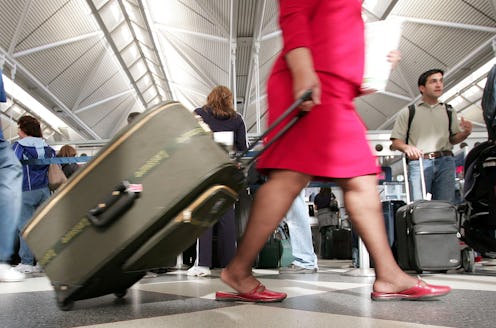Life
This Is How To Take Care Of Your Mental Health While Traveling, According To Experts

While some people find travel therapeutic, others can experience a great deal of distress from it. Even if you are headed to a tropical getaway, traveling can be stressful, and straining on both your physical and mental wellness. Juggling flight or rental car reservations, making sure you get to your terminal on time, finding a second to grab a bite or rest, and unforeseen, last-minute changes are all factors that can contribute to travel-related stress. Everyone can experience anxiety or stress while traveling, but it can be especially trying on those who live with mental health issues — particularly if changes in your routine throw your mental health out of balance.
"Mental health issues like anxiety, post traumatic stress, or depression are helped by creating guardrails or limits around how we spend our time, who we spend our time with, and trying our best to remove daily annoyances," Shannon Thomas, a licensed therapist and author Healing from Hidden Abuse, tells Bustle. "Travel throws all that planning into upheaval — even when travel the is meant for fun. We will be faced with numerous challenges ranging from small to sometimes large when we head out for a trip."
Creating routine is an extremely important and therapeutic act of self-care for people who live with mental illness, and there's no doubt traveling can negatively impact that. Here's how to travel if changes to your routine mess up your mental health, according to mental health experts, as well as avid travelers who live with mental health issues.
Thomas explains maintaining a healthy sleep schedule while traveling, that's similar to your regular schedule, can help diminish stress while traveling. "Allow some flexibility in the time you go to bed and wake up, but resist the temptation to through off all normal times and really disrupt your mind and body. A two hour range from the norm can still allow for fun evenings and time to sleep-in, but that timeframe should not overly stress your mind or body," she explains.
Additionally, Thomas says "keeping our blood sugar steady and staying hydrated helps with limiting what could be triggers while navigating a new area, or when time gets away from us." So, be sure to pack a few nutritious snacks, and drink enough water while in flight, or driving. Thomas suggests utilizing coping skills like listening to music, or bringing ear plugs to tune out are a good idea for anxious travelers.
"When you travel a lot, you need to have a whole arsenal of things to help you get through — especially when dealing with mental illness." Sydney, a mental health advocate who travels often, tells Bustle. She explains she uses small tricks to help her deal with the chaotic schedule that accompanies traveling. "When it comes to medications, I set multiple alarms. When it comes to my mental state, I write every hour. Even if it’s just a little bit. That way, I can log how I’m doing mentally."
Moreover, Madalena, an admissions counselor who regularly travels for work, says that utilizing travel apps can help eliminate stress induced by travel and schedule changes. "TripCase is my travel app godsend. I can input everything — flights, hotels, rental cars, meetings, restaurants — and it makes it so easy to keep track of all the different addresses, confirmation codes, instructions and notes I’m managing," she explains. "I love it, and it helps alleviate a lot of my anxiety and executive dysfunction by keeping everything in one place for me."
All in all, Thomas says the key to eliminating some anxiety over travel and your schedule is to be aware of the time — and how you're spending it. "Being mindful of the passage of time while out of our routine will serve as a grounding technique, as well as keep us close to our eating and sleeping schedules. Even if we vary our routine while traveling, being aware of the day passing helps elevate that out of control feeling that often happens," she says, with an added word of advice: "Write down each of the steps and take the list with you on your trip. It may seem unnecessary while at home but we become more easily flustered while traveling and can forget what makes us feels healthy and good about ourselves."
Though some travel stressors like delays or cancellations can't be avoided, you can utilize coping skills or tools to maintain your routine while traveling. If having a schedule is part of keeping your mental health on the up-and-up, try to be aware of the way travel affects you — and plan ahead to maintain your wellbeing.